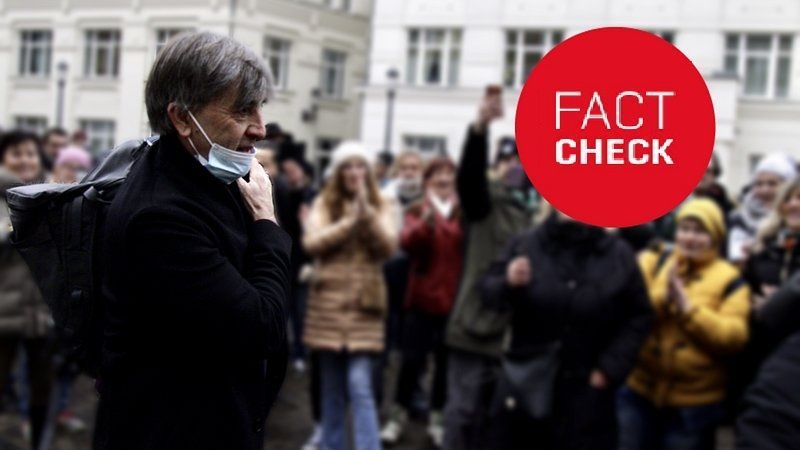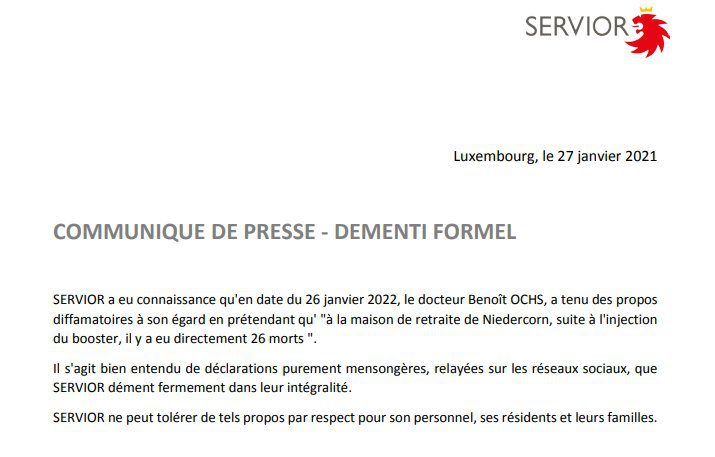
RTL fact checks claims made by the medical practitioner prior to his appeal process.
Ahead of his appeal process, Dr Benoît Ochs made several claims regarding vaccine-related deaths and the treatment of Covid-19 patients in a speech as well as in an interview with RTL.
In 2021, disciplinary proceedings were initiated against Dr Benoît Ochs. The General Practitioner is accused of violating the professional ethics code. The Medical Chamber ultimately decided on a one-year occupational ban. Dr Ochs appealed against this decision and is allowed to practice his profession until the final verdict in the appeal process.
The appeal process started on 26 January 2022. Some one hundred supporters of the GP gathered in front of the court in Luxembourg City. Before entering the courthouse, Dr Benoît Ochs held a speech in front of his supporters and gave an interview to RTL. Both during his speech and the interview with RTL, Dr Ochs made several claims, which he presented as facts.
“Doctors can choose to let patients die at home”, according to Dr Ochs
In his interview with RTL, Dr Ochs tells the story of a Covid-19 patient. In November 2021, he said, she was at home and very sick. The woman from Pintsch near Hosingen allegedly called the emergency number to get in touch with a doctor. Dr Ochs was on-call in Ettelbruck that evening and was contacted by the emergency call centre. The latter supposedly asked Dr Ochs whether he would visit the patient. In response, Dr Ochs asked if this meant he had the right not to go. This led Dr Ochs to wonder whether he has the right to let a patient die at home. He then claimed that doctors are allowed to let Covid-19 patients die alone at home.
According to Dr Ochs, the patient tried to contact doctors in Hosingen for days. However, all of them were allegedly not willing to visit the 43-year-old woman. Dr Ochs further claims that the woman was in hospital for one month and ended up losing 30% of her lungs.
Dr Ochs went on to say that he had recorded the testimonial of this woman and would introduce it as evidence in his upcoming trial. He also claims that this is just one of many cases in Luxembourg. In this context, Dr Ochs mentioned a new protocol that was introduced in 2020 and supposedly stipulates that doctors have the option to let Covid-19 patients die at home, and only have to visit those who are so ill that they can no longer talk.
What is true about this story?
Due to data protection laws, it is impossible to find out who the patient was and if everything actually happened the way Dr Ochs claimed it did.
What is clear, however, is that ill patients are not left to die alone at home. This is true for both Covid-19 patients as well as all other afflicted. A person who is seriously ill can call 112 at all times and will receive help.
When asked about this, the Grand Ducal Fire and Rescue Corps (CGDIS) responded that in the case a patient needs an ambulance or the first responder (Samu) due to an emergency, help will “always” be sent out to treat the patient “competently and as quickly as possible”. Computer-aided despatch is used to support the decision-making process, but ultimately, it is up to the operator to decide which units will be alerted, the CGDIS explained. Since last year, the teams at the emergency call centre also receive 24/7 assistance from a nurse. The CGDIS added that in the case of Covid-19 patients experiencing shortness of breath, an internal protocol actually prioritises the use of an ambulance or Samu, as it is well known that their condition could deteriorate very quickly.
It is true that the doctor on duty has to decide for themselves whether it is necessary to visit the patient at home or not. This responsibility lies with the doctor. However, the emergency call centre only contacts the doctor on duty if it is not an emergency and if the caller specifically asked for a GP.
Thus, it is misleading to claim that the doctor on duty can choose to let patients die at home. If a person’s condition is really serious and they contact 112, the priority will be to send out an ambulance or the first responder.
The CGDIS explained that if someone calls them because they are in need of a GP and it is not an emergency, their teams will proceed to contact the local out-of-hours medical centre (Maison Médicale). At this point, it is up to the doctor on duty to call the patient themselves and decide whether to visit them at home or not.
What about the new protocol from 2020?
It is indeed true that a new protocol for medical professionals was introduced at the start of the pandemic. The protocol reorganised medical care. GPs, specialists, and dentists could register with five different medical groups in order to guarantee medical care for patients. In March 2020, Advanced Care Centres (CSA) were set up for ill people to avoid Covid-19 patients infecting others in ERs or doctor’s offices. However, doctors registered with Medical Group 1 worked in these advanced care centres and also visited Covid-19 patients at home to examine them. The CSAs were open every day from 8am to 8pm. Out of hours, doctors visited patients at home while the emergency call centre continued to respond to emergencies. Thus, the claim that patients were left to die by themselves at home is false. In fact, a specific medial group (No 1) was assembled and tasked with visiting Covid-19 patients at home. Another medical group (No 2) took care of visiting patients who did not have Covid-19. The entire protocol is available here (in French).
Medical care for all kinds of patients was ensured throughout the pandemic
Especially at the start of pandemic, a particular focus was put on remote consultations to avoid crowded waiting rooms. In the case of people who were ill but had not yet tested positive for Covid-19, doctors could perform a number of tests with the patient via phone call to get a first impression of their condition and determine whether an at-home visit was necessary. For instance, the patient was asked to take a few deep breaths or to walk up the stairs, Dr Pit Buchler, the President of the Medical Chamber, explained.
Did 26 residents of a Niedercorn retirement home die after receiving their booster shots?
In his speech that he held in front of his supporters, Dr Ochs claimed that 26 residents of a retirement home in Niedercorn died because they had received booster shots. The GP went on to accuse the media to have covered up the affair.
In February 2021, a major coronavirus cluster was detected at the retirement home ‘Um Lauterbann’ in Niedercorn. The first positive case of a resident was recorded on 17 February 2021. On 18 February 2021, residents and staff members of the retirement home were able to receive their first vaccine doses. On the same day, an employee informed the home’s management that they had tested positive for Covid-19. The virus was thus already present within the home before vaccinations even started. The situation snowballed and developed into a cluster. Between 15 February 2021 and 24 March 2021, 22 residents of the retirement home died with or from the coronavirus. The average age of those affected was 87.7 years.
Booster shots were administered at the retirement home ‘Um Lauterbann’ on 30 September 2021. Since then, eight residents of this home died (as of 28 January 2022). None of them was infected with Covid-19.
Nathalie Hanck, spokeswoman for SERVIOR, which manages the home, stated that SERVIOR can confirm the eight deaths among its residents. Their average age was 86 years. “To our knowledge”, Hanck explained, “none of these deaths are related to Covid-19”. As stated in a previously released press release, SERVIOR is aware that on 26 January 2022, Dr Benoît OCHS made defamatory statements about SERVIOR, claiming that 26 deaths of residents were related to the injection of booster shots. Hanck stressed that these are claims are “complete lies, shared on social media”, firmly rejected by SERVIOR.

Thus, no residents of the retirement home in Niedercorn died as a result of having received their booster shots. The claim made by Dr Ochs is false.
Links


